Harry's Case Study: Nursing Report on Hip Replacement and Weight
VerifiedAdded on 2022/11/14
|8
|2065
|344
Report
AI Summary
This report presents a nursing case study of Harry, a 58-year-old chef scheduled for hip replacement surgery due to his excessive weight. The student, acting as a healthcare professional, aims to implement behavior change strategies over four days using the transtheoretical model and motivational interviewing. The report details the application of the transtheoretical model, outlining the stages of pre-contemplation, contemplation, preparation, action, and maintenance in Harry's context. It emphasizes the role of motivational interviewing, particularly active listening and empathy, to address Harry's resistance to change. The report discusses the importance of individualizing the approach based on psychological motives, environmental factors, and the development of a therapeutic relationship. The action plan includes dietary modifications, increased fluid intake, and community-based support. The report concludes that the combined use of the transtheoretical model and motivational interviewing can effectively promote lifestyle changes for Harry, leading to improved health outcomes.
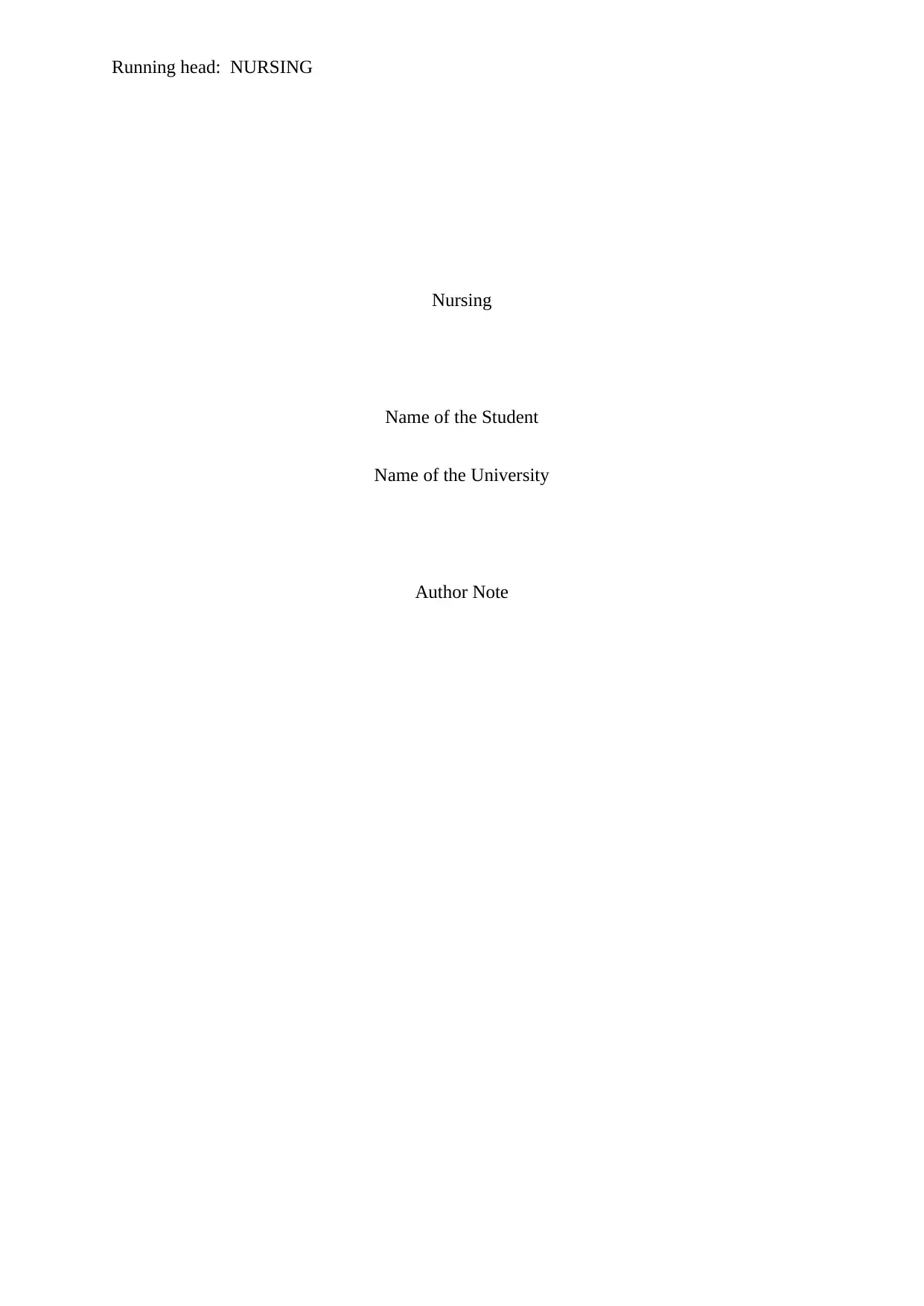
Running head: NURSING
Nursing
Name of the Student
Name of the University
Author Note
Nursing
Name of the Student
Name of the University
Author Note
Paraphrase This Document
Need a fresh take? Get an instant paraphrase of this document with our AI Paraphraser
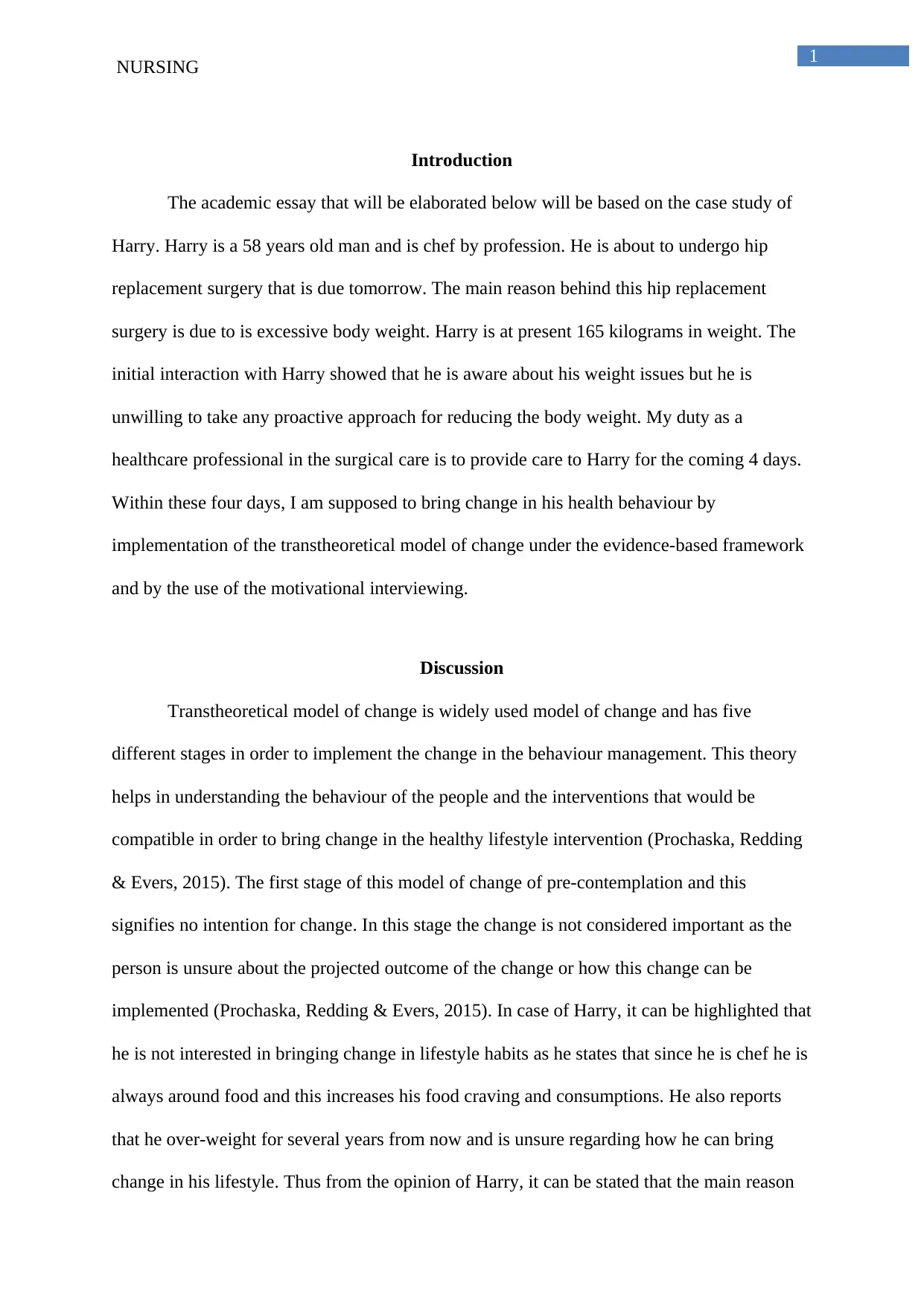
1
NURSING
Introduction
The academic essay that will be elaborated below will be based on the case study of
Harry. Harry is a 58 years old man and is chef by profession. He is about to undergo hip
replacement surgery that is due tomorrow. The main reason behind this hip replacement
surgery is due to is excessive body weight. Harry is at present 165 kilograms in weight. The
initial interaction with Harry showed that he is aware about his weight issues but he is
unwilling to take any proactive approach for reducing the body weight. My duty as a
healthcare professional in the surgical care is to provide care to Harry for the coming 4 days.
Within these four days, I am supposed to bring change in his health behaviour by
implementation of the transtheoretical model of change under the evidence-based framework
and by the use of the motivational interviewing.
Discussion
Transtheoretical model of change is widely used model of change and has five
different stages in order to implement the change in the behaviour management. This theory
helps in understanding the behaviour of the people and the interventions that would be
compatible in order to bring change in the healthy lifestyle intervention (Prochaska, Redding
& Evers, 2015). The first stage of this model of change of pre-contemplation and this
signifies no intention for change. In this stage the change is not considered important as the
person is unsure about the projected outcome of the change or how this change can be
implemented (Prochaska, Redding & Evers, 2015). In case of Harry, it can be highlighted that
he is not interested in bringing change in lifestyle habits as he states that since he is chef he is
always around food and this increases his food craving and consumptions. He also reports
that he over-weight for several years from now and is unsure regarding how he can bring
change in his lifestyle. Thus from the opinion of Harry, it can be stated that the main reason
NURSING
Introduction
The academic essay that will be elaborated below will be based on the case study of
Harry. Harry is a 58 years old man and is chef by profession. He is about to undergo hip
replacement surgery that is due tomorrow. The main reason behind this hip replacement
surgery is due to is excessive body weight. Harry is at present 165 kilograms in weight. The
initial interaction with Harry showed that he is aware about his weight issues but he is
unwilling to take any proactive approach for reducing the body weight. My duty as a
healthcare professional in the surgical care is to provide care to Harry for the coming 4 days.
Within these four days, I am supposed to bring change in his health behaviour by
implementation of the transtheoretical model of change under the evidence-based framework
and by the use of the motivational interviewing.
Discussion
Transtheoretical model of change is widely used model of change and has five
different stages in order to implement the change in the behaviour management. This theory
helps in understanding the behaviour of the people and the interventions that would be
compatible in order to bring change in the healthy lifestyle intervention (Prochaska, Redding
& Evers, 2015). The first stage of this model of change of pre-contemplation and this
signifies no intention for change. In this stage the change is not considered important as the
person is unsure about the projected outcome of the change or how this change can be
implemented (Prochaska, Redding & Evers, 2015). In case of Harry, it can be highlighted that
he is not interested in bringing change in lifestyle habits as he states that since he is chef he is
always around food and this increases his food craving and consumptions. He also reports
that he over-weight for several years from now and is unsure regarding how he can bring
change in his lifestyle. Thus from the opinion of Harry, it can be stated that the main reason
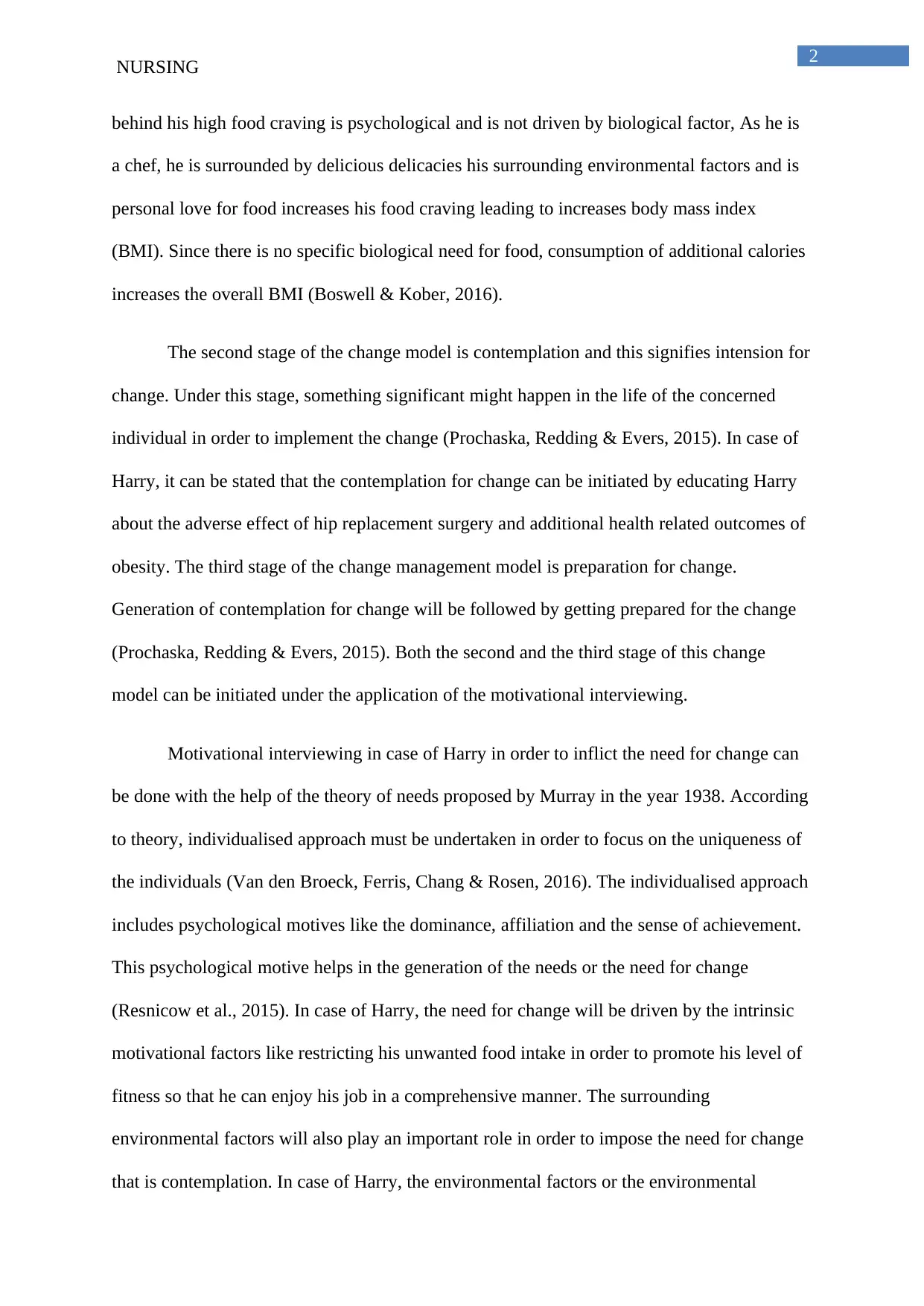
2
NURSING
behind his high food craving is psychological and is not driven by biological factor, As he is
a chef, he is surrounded by delicious delicacies his surrounding environmental factors and is
personal love for food increases his food craving leading to increases body mass index
(BMI). Since there is no specific biological need for food, consumption of additional calories
increases the overall BMI (Boswell & Kober, 2016).
The second stage of the change model is contemplation and this signifies intension for
change. Under this stage, something significant might happen in the life of the concerned
individual in order to implement the change (Prochaska, Redding & Evers, 2015). In case of
Harry, it can be stated that the contemplation for change can be initiated by educating Harry
about the adverse effect of hip replacement surgery and additional health related outcomes of
obesity. The third stage of the change management model is preparation for change.
Generation of contemplation for change will be followed by getting prepared for the change
(Prochaska, Redding & Evers, 2015). Both the second and the third stage of this change
model can be initiated under the application of the motivational interviewing.
Motivational interviewing in case of Harry in order to inflict the need for change can
be done with the help of the theory of needs proposed by Murray in the year 1938. According
to theory, individualised approach must be undertaken in order to focus on the uniqueness of
the individuals (Van den Broeck, Ferris, Chang & Rosen, 2016). The individualised approach
includes psychological motives like the dominance, affiliation and the sense of achievement.
This psychological motive helps in the generation of the needs or the need for change
(Resnicow et al., 2015). In case of Harry, the need for change will be driven by the intrinsic
motivational factors like restricting his unwanted food intake in order to promote his level of
fitness so that he can enjoy his job in a comprehensive manner. The surrounding
environmental factors will also play an important role in order to impose the need for change
that is contemplation. In case of Harry, the environmental factors or the environmental
NURSING
behind his high food craving is psychological and is not driven by biological factor, As he is
a chef, he is surrounded by delicious delicacies his surrounding environmental factors and is
personal love for food increases his food craving leading to increases body mass index
(BMI). Since there is no specific biological need for food, consumption of additional calories
increases the overall BMI (Boswell & Kober, 2016).
The second stage of the change model is contemplation and this signifies intension for
change. Under this stage, something significant might happen in the life of the concerned
individual in order to implement the change (Prochaska, Redding & Evers, 2015). In case of
Harry, it can be stated that the contemplation for change can be initiated by educating Harry
about the adverse effect of hip replacement surgery and additional health related outcomes of
obesity. The third stage of the change management model is preparation for change.
Generation of contemplation for change will be followed by getting prepared for the change
(Prochaska, Redding & Evers, 2015). Both the second and the third stage of this change
model can be initiated under the application of the motivational interviewing.
Motivational interviewing in case of Harry in order to inflict the need for change can
be done with the help of the theory of needs proposed by Murray in the year 1938. According
to theory, individualised approach must be undertaken in order to focus on the uniqueness of
the individuals (Van den Broeck, Ferris, Chang & Rosen, 2016). The individualised approach
includes psychological motives like the dominance, affiliation and the sense of achievement.
This psychological motive helps in the generation of the needs or the need for change
(Resnicow et al., 2015). In case of Harry, the need for change will be driven by the intrinsic
motivational factors like restricting his unwanted food intake in order to promote his level of
fitness so that he can enjoy his job in a comprehensive manner. The surrounding
environmental factors will also play an important role in order to impose the need for change
that is contemplation. In case of Harry, the environmental factors or the environmental
⊘ This is a preview!⊘
Do you want full access?
Subscribe today to unlock all pages.

Trusted by 1+ million students worldwide
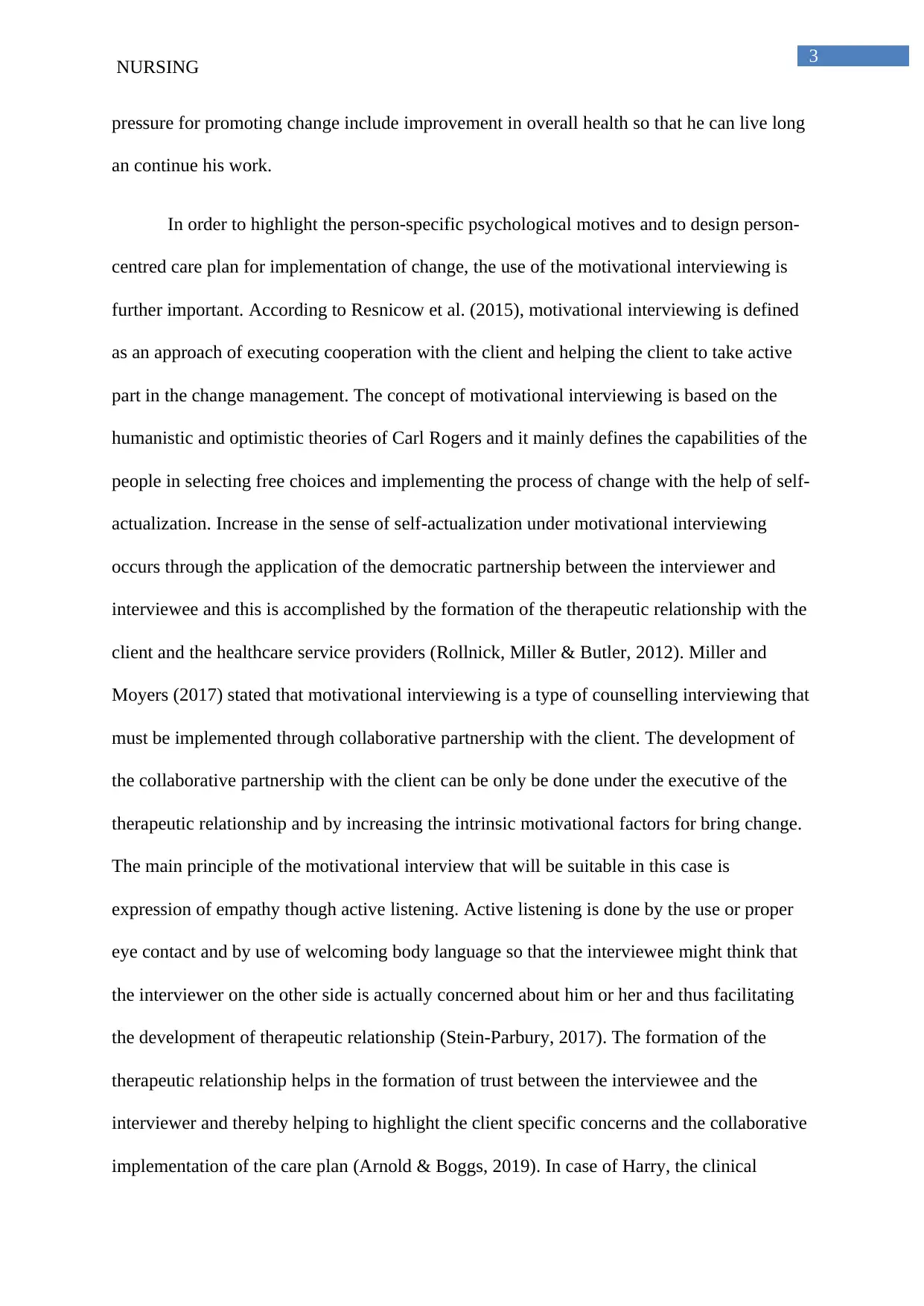
3
NURSING
pressure for promoting change include improvement in overall health so that he can live long
an continue his work.
In order to highlight the person-specific psychological motives and to design person-
centred care plan for implementation of change, the use of the motivational interviewing is
further important. According to Resnicow et al. (2015), motivational interviewing is defined
as an approach of executing cooperation with the client and helping the client to take active
part in the change management. The concept of motivational interviewing is based on the
humanistic and optimistic theories of Carl Rogers and it mainly defines the capabilities of the
people in selecting free choices and implementing the process of change with the help of self-
actualization. Increase in the sense of self-actualization under motivational interviewing
occurs through the application of the democratic partnership between the interviewer and
interviewee and this is accomplished by the formation of the therapeutic relationship with the
client and the healthcare service providers (Rollnick, Miller & Butler, 2012). Miller and
Moyers (2017) stated that motivational interviewing is a type of counselling interviewing that
must be implemented through collaborative partnership with the client. The development of
the collaborative partnership with the client can be only be done under the executive of the
therapeutic relationship and by increasing the intrinsic motivational factors for bring change.
The main principle of the motivational interview that will be suitable in this case is
expression of empathy though active listening. Active listening is done by the use or proper
eye contact and by use of welcoming body language so that the interviewee might think that
the interviewer on the other side is actually concerned about him or her and thus facilitating
the development of therapeutic relationship (Stein-Parbury, 2017). The formation of the
therapeutic relationship helps in the formation of trust between the interviewee and the
interviewer and thereby helping to highlight the client specific concerns and the collaborative
implementation of the care plan (Arnold & Boggs, 2019). In case of Harry, the clinical
NURSING
pressure for promoting change include improvement in overall health so that he can live long
an continue his work.
In order to highlight the person-specific psychological motives and to design person-
centred care plan for implementation of change, the use of the motivational interviewing is
further important. According to Resnicow et al. (2015), motivational interviewing is defined
as an approach of executing cooperation with the client and helping the client to take active
part in the change management. The concept of motivational interviewing is based on the
humanistic and optimistic theories of Carl Rogers and it mainly defines the capabilities of the
people in selecting free choices and implementing the process of change with the help of self-
actualization. Increase in the sense of self-actualization under motivational interviewing
occurs through the application of the democratic partnership between the interviewer and
interviewee and this is accomplished by the formation of the therapeutic relationship with the
client and the healthcare service providers (Rollnick, Miller & Butler, 2012). Miller and
Moyers (2017) stated that motivational interviewing is a type of counselling interviewing that
must be implemented through collaborative partnership with the client. The development of
the collaborative partnership with the client can be only be done under the executive of the
therapeutic relationship and by increasing the intrinsic motivational factors for bring change.
The main principle of the motivational interview that will be suitable in this case is
expression of empathy though active listening. Active listening is done by the use or proper
eye contact and by use of welcoming body language so that the interviewee might think that
the interviewer on the other side is actually concerned about him or her and thus facilitating
the development of therapeutic relationship (Stein-Parbury, 2017). The formation of the
therapeutic relationship helps in the formation of trust between the interviewee and the
interviewer and thereby helping to highlight the client specific concerns and the collaborative
implementation of the care plan (Arnold & Boggs, 2019). In case of Harry, the clinical
Paraphrase This Document
Need a fresh take? Get an instant paraphrase of this document with our AI Paraphraser
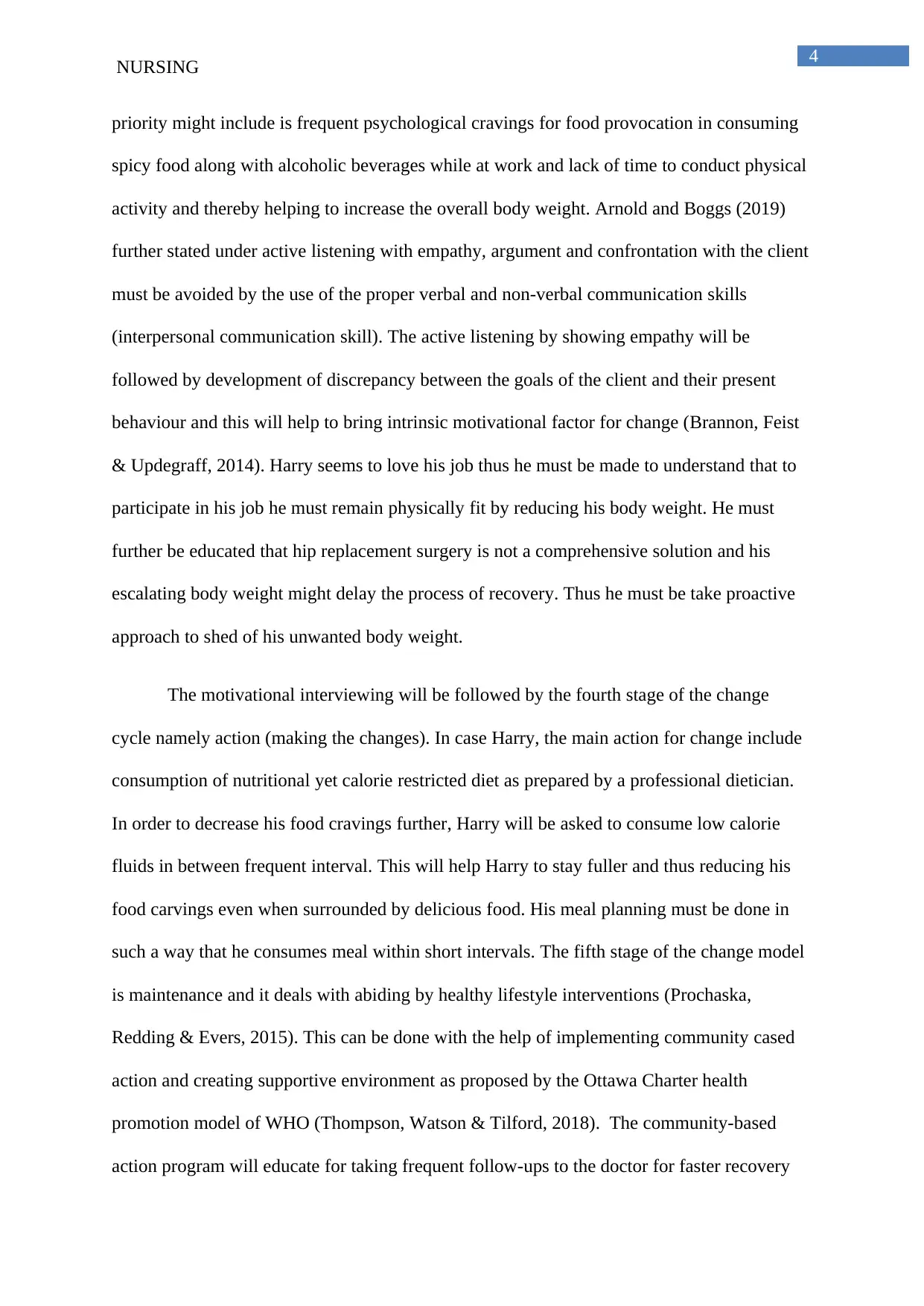
4
NURSING
priority might include is frequent psychological cravings for food provocation in consuming
spicy food along with alcoholic beverages while at work and lack of time to conduct physical
activity and thereby helping to increase the overall body weight. Arnold and Boggs (2019)
further stated under active listening with empathy, argument and confrontation with the client
must be avoided by the use of the proper verbal and non-verbal communication skills
(interpersonal communication skill). The active listening by showing empathy will be
followed by development of discrepancy between the goals of the client and their present
behaviour and this will help to bring intrinsic motivational factor for change (Brannon, Feist
& Updegraff, 2014). Harry seems to love his job thus he must be made to understand that to
participate in his job he must remain physically fit by reducing his body weight. He must
further be educated that hip replacement surgery is not a comprehensive solution and his
escalating body weight might delay the process of recovery. Thus he must be take proactive
approach to shed of his unwanted body weight.
The motivational interviewing will be followed by the fourth stage of the change
cycle namely action (making the changes). In case Harry, the main action for change include
consumption of nutritional yet calorie restricted diet as prepared by a professional dietician.
In order to decrease his food cravings further, Harry will be asked to consume low calorie
fluids in between frequent interval. This will help Harry to stay fuller and thus reducing his
food carvings even when surrounded by delicious food. His meal planning must be done in
such a way that he consumes meal within short intervals. The fifth stage of the change model
is maintenance and it deals with abiding by healthy lifestyle interventions (Prochaska,
Redding & Evers, 2015). This can be done with the help of implementing community cased
action and creating supportive environment as proposed by the Ottawa Charter health
promotion model of WHO (Thompson, Watson & Tilford, 2018). The community-based
action program will educate for taking frequent follow-ups to the doctor for faster recovery
NURSING
priority might include is frequent psychological cravings for food provocation in consuming
spicy food along with alcoholic beverages while at work and lack of time to conduct physical
activity and thereby helping to increase the overall body weight. Arnold and Boggs (2019)
further stated under active listening with empathy, argument and confrontation with the client
must be avoided by the use of the proper verbal and non-verbal communication skills
(interpersonal communication skill). The active listening by showing empathy will be
followed by development of discrepancy between the goals of the client and their present
behaviour and this will help to bring intrinsic motivational factor for change (Brannon, Feist
& Updegraff, 2014). Harry seems to love his job thus he must be made to understand that to
participate in his job he must remain physically fit by reducing his body weight. He must
further be educated that hip replacement surgery is not a comprehensive solution and his
escalating body weight might delay the process of recovery. Thus he must be take proactive
approach to shed of his unwanted body weight.
The motivational interviewing will be followed by the fourth stage of the change
cycle namely action (making the changes). In case Harry, the main action for change include
consumption of nutritional yet calorie restricted diet as prepared by a professional dietician.
In order to decrease his food cravings further, Harry will be asked to consume low calorie
fluids in between frequent interval. This will help Harry to stay fuller and thus reducing his
food carvings even when surrounded by delicious food. His meal planning must be done in
such a way that he consumes meal within short intervals. The fifth stage of the change model
is maintenance and it deals with abiding by healthy lifestyle interventions (Prochaska,
Redding & Evers, 2015). This can be done with the help of implementing community cased
action and creating supportive environment as proposed by the Ottawa Charter health
promotion model of WHO (Thompson, Watson & Tilford, 2018). The community-based
action program will educate for taking frequent follow-ups to the doctor for faster recovery
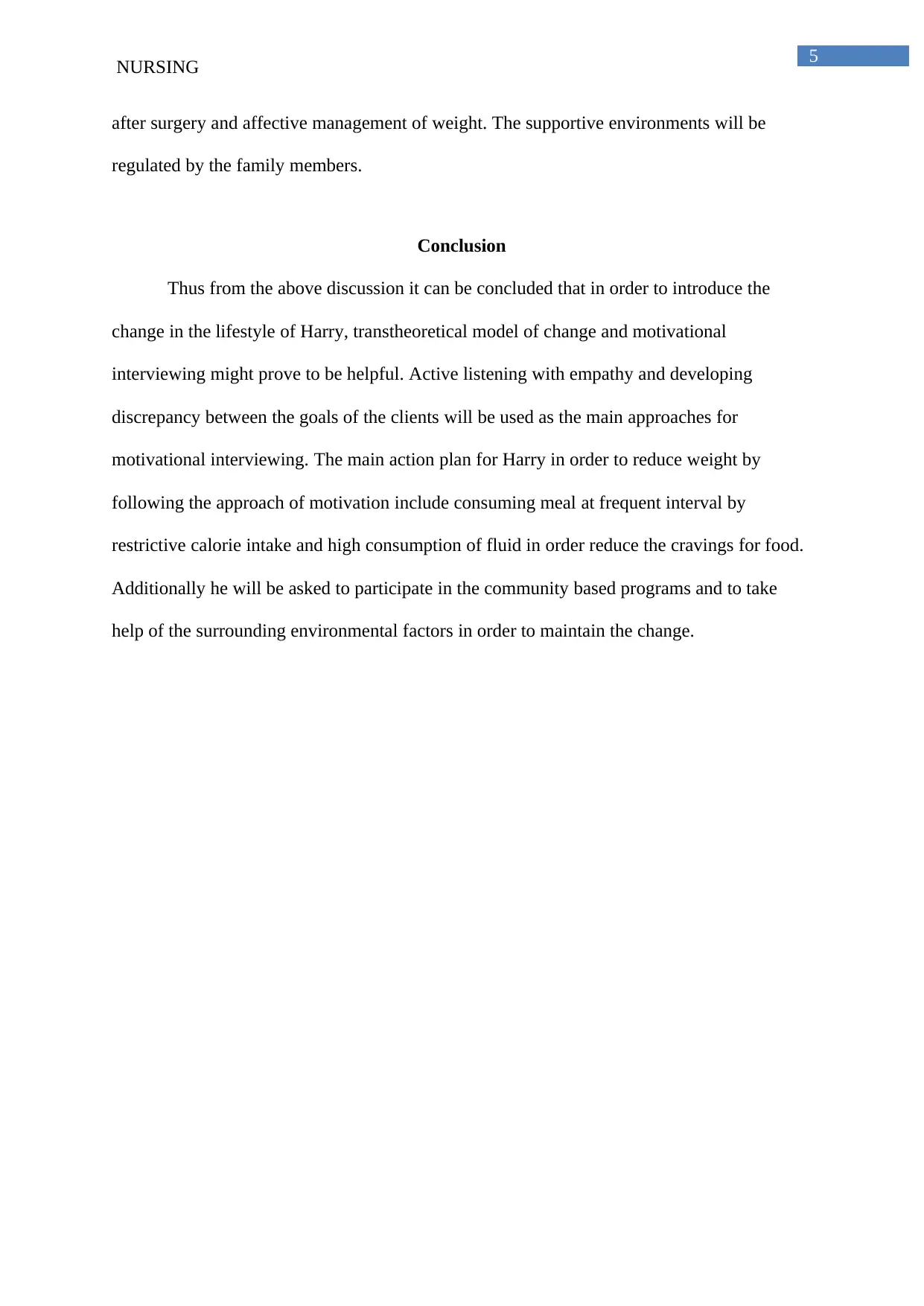
5
NURSING
after surgery and affective management of weight. The supportive environments will be
regulated by the family members.
Conclusion
Thus from the above discussion it can be concluded that in order to introduce the
change in the lifestyle of Harry, transtheoretical model of change and motivational
interviewing might prove to be helpful. Active listening with empathy and developing
discrepancy between the goals of the clients will be used as the main approaches for
motivational interviewing. The main action plan for Harry in order to reduce weight by
following the approach of motivation include consuming meal at frequent interval by
restrictive calorie intake and high consumption of fluid in order reduce the cravings for food.
Additionally he will be asked to participate in the community based programs and to take
help of the surrounding environmental factors in order to maintain the change.
NURSING
after surgery and affective management of weight. The supportive environments will be
regulated by the family members.
Conclusion
Thus from the above discussion it can be concluded that in order to introduce the
change in the lifestyle of Harry, transtheoretical model of change and motivational
interviewing might prove to be helpful. Active listening with empathy and developing
discrepancy between the goals of the clients will be used as the main approaches for
motivational interviewing. The main action plan for Harry in order to reduce weight by
following the approach of motivation include consuming meal at frequent interval by
restrictive calorie intake and high consumption of fluid in order reduce the cravings for food.
Additionally he will be asked to participate in the community based programs and to take
help of the surrounding environmental factors in order to maintain the change.
⊘ This is a preview!⊘
Do you want full access?
Subscribe today to unlock all pages.

Trusted by 1+ million students worldwide
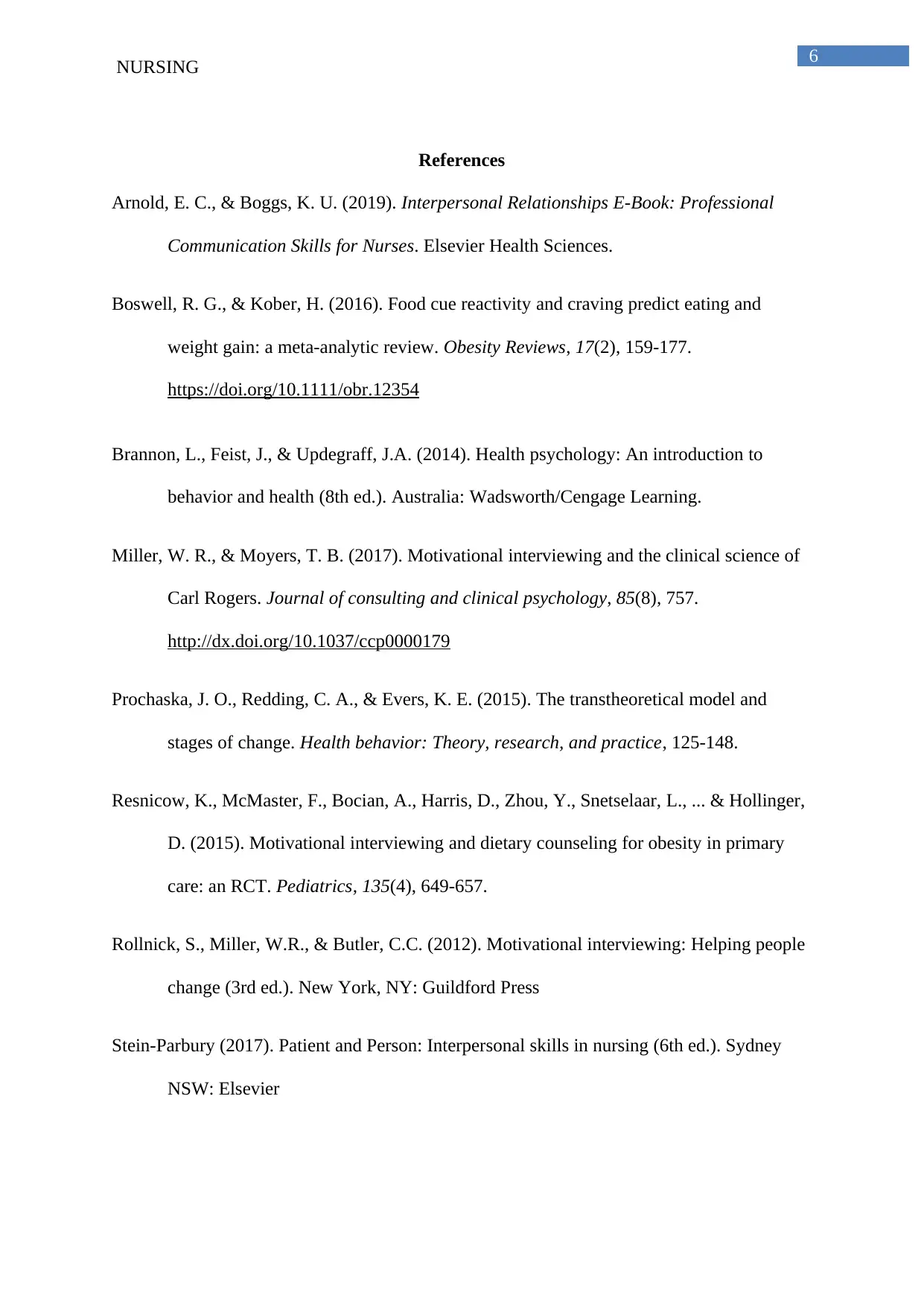
6
NURSING
References
Arnold, E. C., & Boggs, K. U. (2019). Interpersonal Relationships E-Book: Professional
Communication Skills for Nurses. Elsevier Health Sciences.
Boswell, R. G., & Kober, H. (2016). Food cue reactivity and craving predict eating and
weight gain: a meta‐analytic review. Obesity Reviews, 17(2), 159-177.
https://doi.org/10.1111/obr.12354
Brannon, L., Feist, J., & Updegraff, J.A. (2014). Health psychology: An introduction to
behavior and health (8th ed.). Australia: Wadsworth/Cengage Learning.
Miller, W. R., & Moyers, T. B. (2017). Motivational interviewing and the clinical science of
Carl Rogers. Journal of consulting and clinical psychology, 85(8), 757.
http://dx.doi.org/10.1037/ccp0000179
Prochaska, J. O., Redding, C. A., & Evers, K. E. (2015). The transtheoretical model and
stages of change. Health behavior: Theory, research, and practice, 125-148.
Resnicow, K., McMaster, F., Bocian, A., Harris, D., Zhou, Y., Snetselaar, L., ... & Hollinger,
D. (2015). Motivational interviewing and dietary counseling for obesity in primary
care: an RCT. Pediatrics, 135(4), 649-657.
Rollnick, S., Miller, W.R., & Butler, C.C. (2012). Motivational interviewing: Helping people
change (3rd ed.). New York, NY: Guildford Press
Stein-Parbury (2017). Patient and Person: Interpersonal skills in nursing (6th ed.). Sydney
NSW: Elsevier
NURSING
References
Arnold, E. C., & Boggs, K. U. (2019). Interpersonal Relationships E-Book: Professional
Communication Skills for Nurses. Elsevier Health Sciences.
Boswell, R. G., & Kober, H. (2016). Food cue reactivity and craving predict eating and
weight gain: a meta‐analytic review. Obesity Reviews, 17(2), 159-177.
https://doi.org/10.1111/obr.12354
Brannon, L., Feist, J., & Updegraff, J.A. (2014). Health psychology: An introduction to
behavior and health (8th ed.). Australia: Wadsworth/Cengage Learning.
Miller, W. R., & Moyers, T. B. (2017). Motivational interviewing and the clinical science of
Carl Rogers. Journal of consulting and clinical psychology, 85(8), 757.
http://dx.doi.org/10.1037/ccp0000179
Prochaska, J. O., Redding, C. A., & Evers, K. E. (2015). The transtheoretical model and
stages of change. Health behavior: Theory, research, and practice, 125-148.
Resnicow, K., McMaster, F., Bocian, A., Harris, D., Zhou, Y., Snetselaar, L., ... & Hollinger,
D. (2015). Motivational interviewing and dietary counseling for obesity in primary
care: an RCT. Pediatrics, 135(4), 649-657.
Rollnick, S., Miller, W.R., & Butler, C.C. (2012). Motivational interviewing: Helping people
change (3rd ed.). New York, NY: Guildford Press
Stein-Parbury (2017). Patient and Person: Interpersonal skills in nursing (6th ed.). Sydney
NSW: Elsevier
Paraphrase This Document
Need a fresh take? Get an instant paraphrase of this document with our AI Paraphraser
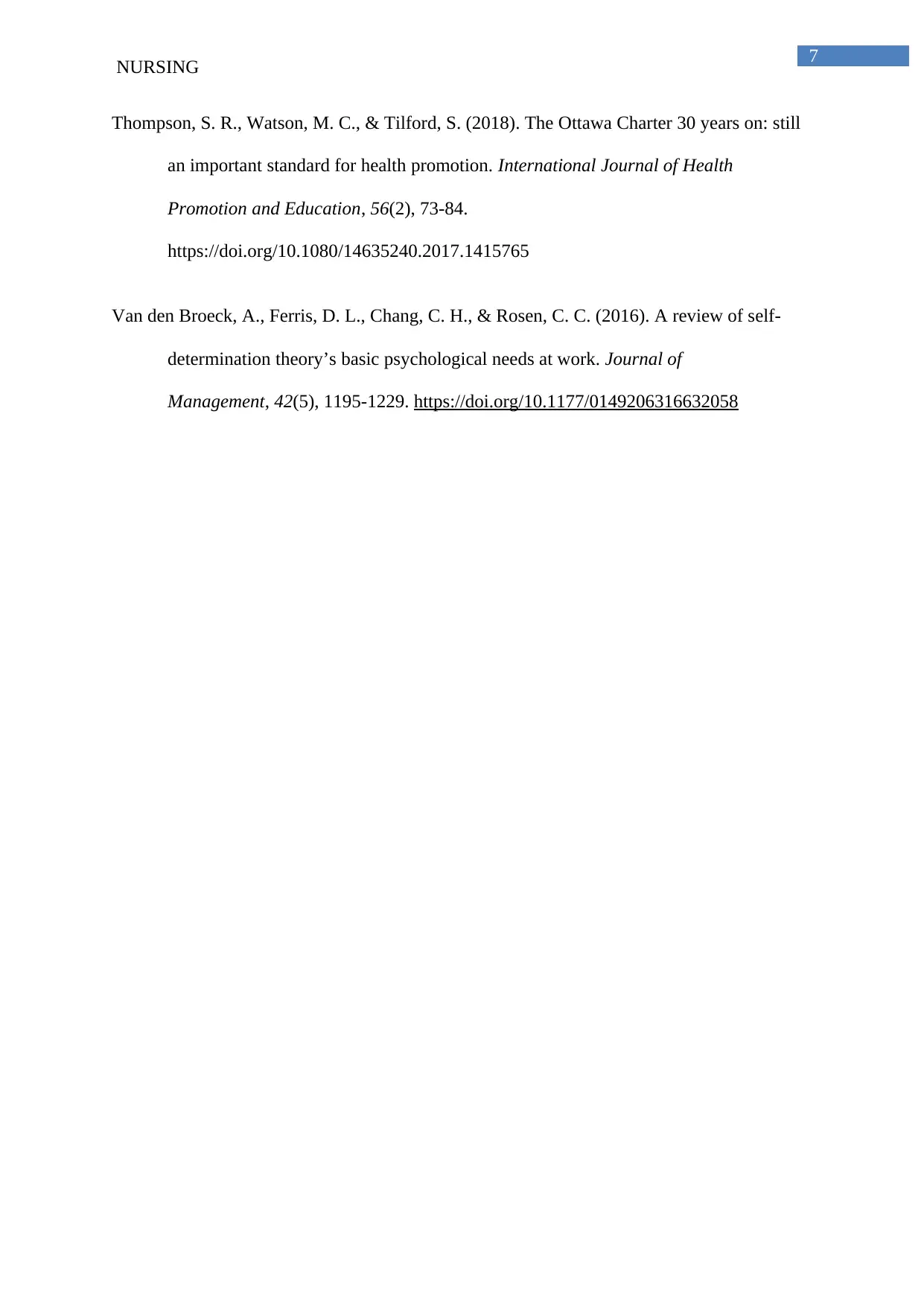
7
NURSING
Thompson, S. R., Watson, M. C., & Tilford, S. (2018). The Ottawa Charter 30 years on: still
an important standard for health promotion. International Journal of Health
Promotion and Education, 56(2), 73-84.
https://doi.org/10.1080/14635240.2017.1415765
Van den Broeck, A., Ferris, D. L., Chang, C. H., & Rosen, C. C. (2016). A review of self-
determination theory’s basic psychological needs at work. Journal of
Management, 42(5), 1195-1229. https://doi.org/10.1177/0149206316632058
NURSING
Thompson, S. R., Watson, M. C., & Tilford, S. (2018). The Ottawa Charter 30 years on: still
an important standard for health promotion. International Journal of Health
Promotion and Education, 56(2), 73-84.
https://doi.org/10.1080/14635240.2017.1415765
Van den Broeck, A., Ferris, D. L., Chang, C. H., & Rosen, C. C. (2016). A review of self-
determination theory’s basic psychological needs at work. Journal of
Management, 42(5), 1195-1229. https://doi.org/10.1177/0149206316632058
1 out of 8
Related Documents
Your All-in-One AI-Powered Toolkit for Academic Success.
+13062052269
info@desklib.com
Available 24*7 on WhatsApp / Email
![[object Object]](/_next/static/media/star-bottom.7253800d.svg)
Unlock your academic potential
Copyright © 2020–2026 A2Z Services. All Rights Reserved. Developed and managed by ZUCOL.





